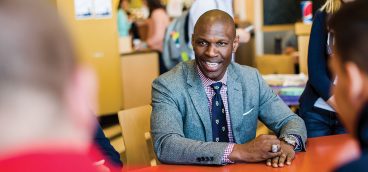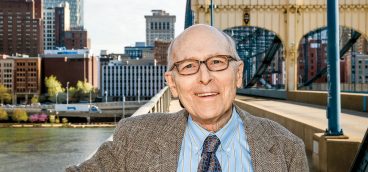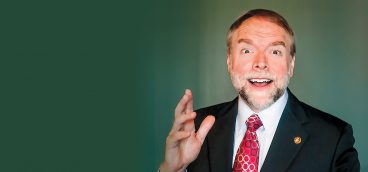Astro Teller, Entrepreneur and Author

I’m an entrepreneur, the CEO of a company. That takes up a lot of my time. But I love playing with my kids, doing things with friends and getting exercise. I’ve also found that I need artistic stimulation to exercise the other part of my brain.
That’s one of the reasons I write. It helps me to recharge, to gain other perspectives and to practice being creative. I believe that one of the keys to a healthy life is balance.
I was born in Cambridge, England, but grew up mostly in Evanston, Ill. It was a wonderful place. I had a good childhood, but it was very inwardly focused. I read voraciously, mostly fiction. My dad also read to us kids a lot. The Iliad. The Odyssey. Winnie the Pooh. Gulliver’s Travels. My parents were hyper-intellectual hippies, so I grew up with a general snootiness imparted to me from them about a lot of things, and books were no exception. I read the types of books that had been imbedded in my little world, many of which were classics.
One day, when I was about 13, I was walking with my father and brother on a hiking trail in the Grand Tetons. Some people who were traveling in the opposite direction stopped and said hello to my dad. Truthfully, my dad cares a lot less about what other people think than most dads. I now admire that about him. But back then, he certainly was less ‘socially acceptable’ than other dads. I thought, ‘My God, these people have no idea that he’s the world’s biggest dork! They said hi to him just like he was a normal person!’ I guessed it was because they hadn’t had the benefit of seeing him be a dork as I had. Then it hit me: the greatest single epiphany I’ve ever had in my life. I saw the extent to which you are who you appear to be. You are the sum of your actions. But you are only the sum of your actions that others see going forward. They tend not to know about things that happened in the past. To understand that was to understand to what extent one could ‘brand’ oneself—not in the P.R. sense, but in the individual, one-on-one sense. It changed my outlook on how I interacted with people. It became a project to ‘reinvent’ myself. So for the next six or seven years, probably until the middle of college, I was very active in trying on different personas to find out who I wanted to be in the world.
My mother’s father won a Nobel Prize in economics. My father’s father, Edward Teller, was a very famous physicist and political figure. My dad is a philosopher of quantum mechanics. My mom has been a fashion designer. She’s taught gifted kids. She just recently got her second or third master’s degree, this one in clinical psychology, and she’s doing therapy now. They’ve done and are still doing cool things, and I’ve been inspired by that. I’m very fond of and proud of my relatives. They helped to form me in a lot of ways. But I work hard not to define myself by them. I never wanted to be somebody whose biggest achievement was having somebody else’s genes.
I got into computer science at Stanford essentially for extra credit. I got to skip a lot of the basic programming courses. And I had a great T.A. named Nick Parlante who was genuinely excited about the field. His enthusiasm for computer science was sort of my tipping point into it. I especially enjoyed artificial intelligence because it was the area I felt had the most opportunity to be a pioneer. The rest of computer science had an incredible amount still to be discovered, but it had become a rigorous process in which creativity took a second place to mathematical precision. I’m good at math, but I think I’m better at thinking ‘outside the box,’ a term I hate, which means to find unusual perspectives that lead to unusual solutions. Even today, artificial intelligence is only at the point where physics was in the 1870s. We’re just starting to understand the meat of it. Most of the real ‘a-has’ are still in front of us.
So I got a Ph.D., published papers and was having reasonable success. And I learned the great thing about academia: you can do whatever you want. The potential is always there for doing something really revolutionary. I also learned the bad thing about academia: You can do whatever you want. There’s no requirement that you be doing something that is important to anyone else. That’s one of the reasons I chose to leave academia for business. At this time in my life, I find myself attracted to real-world issues and challenges.
One of the most significant crises we’re facing in society today is in health care. And one major problem is the fact that people don’t take care of themselves. Not managing one’s lifestyle versus managing it can mean the difference between massive and modest health-care costs. That’s where our company is making a real contribution. We’re one of the pioneers in helping caregivers understand the lifestyles of their patients and helping people regain balance in their lives through lifestyle changes such as weight, sleep and stress management.
BodyMedia offers state-of-the-art wearable body monitors. I’m not talking about the old glue-on-the-chest-with-big-black-boxes type of thing. Ours is a small, light and comfortable armband. With these devices, the data can be used both to evaluate people and for people to evaluate themselves. I like the idea that what my colleagues and I have been working on is helping people get a handle on what they actually do and how they might be able to do things better.
For me, being on the business side of technology as opposed to the academic side is a trade-off because it means that maybe I don’t get to do a lot of things that I may find intellectually interesting, which could be why I do some things, such as writing, on the side. But I always knew that it wouldn’t stimulate me to develop technology that’s chief contribution was, for example, to make a dishwasher turn on because it ‘smells’ that the dishes are dirty. What interests me is developing technology that actually contributes to making the world a better place. What could be more fulfilling than that?”





